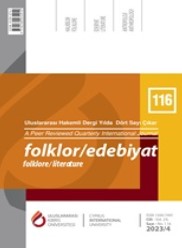Turkish Gothic, Universal Angst: The Impossibility of Non-Existence in Dracula(s)
Turkish Gothic, Universal Angst: The Impossibility of Non-Existence in Dracula(s)
Author(s): Hatice KaramanSubject(s): Turkish Literature, Existentialism, Theory of Literature, Ontology
Published by: Uluslararası Kıbrıs Üniversitesi
Keywords: Dracula in Istanbul; death; the uncanny; Levinas; gothic;
Summary/Abstract: The source of horror is mostly correlated with the horror of the final encounter, death. As the form of ceasing to exist, death has troubled humankind since the very beginning of history. Therefore, the question of death is immediately associated with “to be or not to be”, the most gothic of all questions. Being and Non-being, with the abyss of death tormenting human for ages, hold a prominent space as the uncanniest aspect of human condition, best exemplified by Gothic writings. Those who lack a proper death and who cannot cease to exist (i.e. the vampires) have been the staple tropes of Gothic fiction, globally. By converting the Heideggerian “angst”, Emmanuel Levinas suggests that horror is the fear of not being able to escape from Being. The present study focuses on Ali Rıza Seyfioğlu’s Kazıklı Voyvoda, which in 2017 saw its English translation as Dracula in Istanbul. The first part discusses the representations of evil and good in relation with the Heideggerian uncanny; instrumental for this is an overview of Levinas’s suggestions about horror, death, and existence. The second part emphasizes the ethico-ontological reflections in Bram Stoker’s Dracula in comparison with the adapted Turkish novel. This comparison, thus, argues for the global human conundrum regarding the question of death and non-being as the most universal cause of horror, terror, and anxiety.
Journal: Folklor/Edebiyat
- Issue Year: 29/2023
- Issue No: 116
- Page Range: 1151-1164
- Page Count: 14
- Language: English

